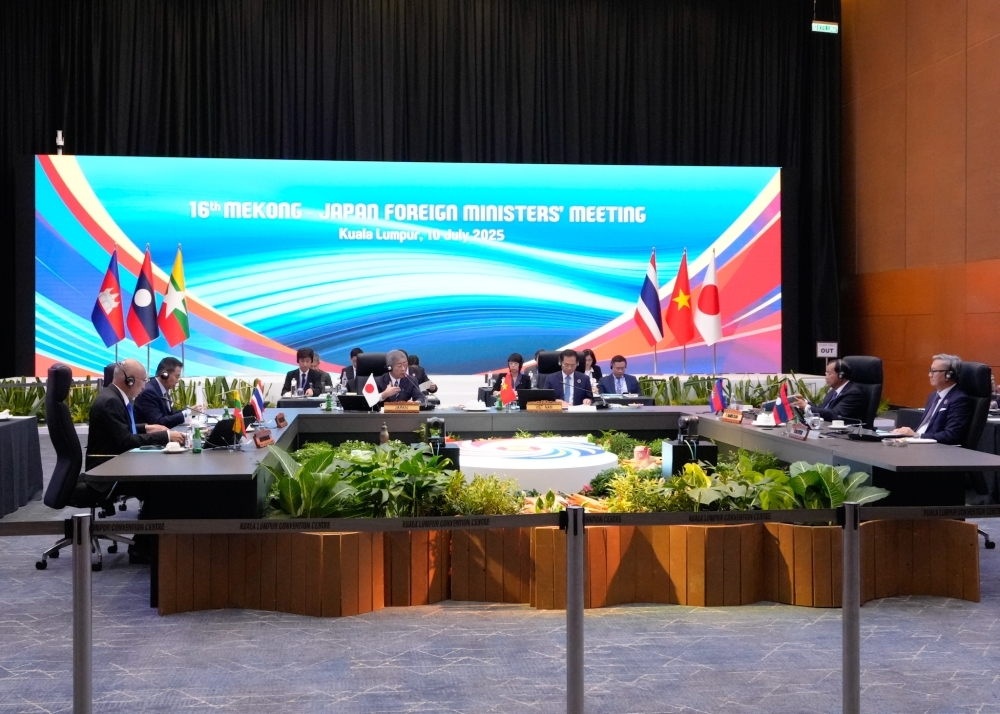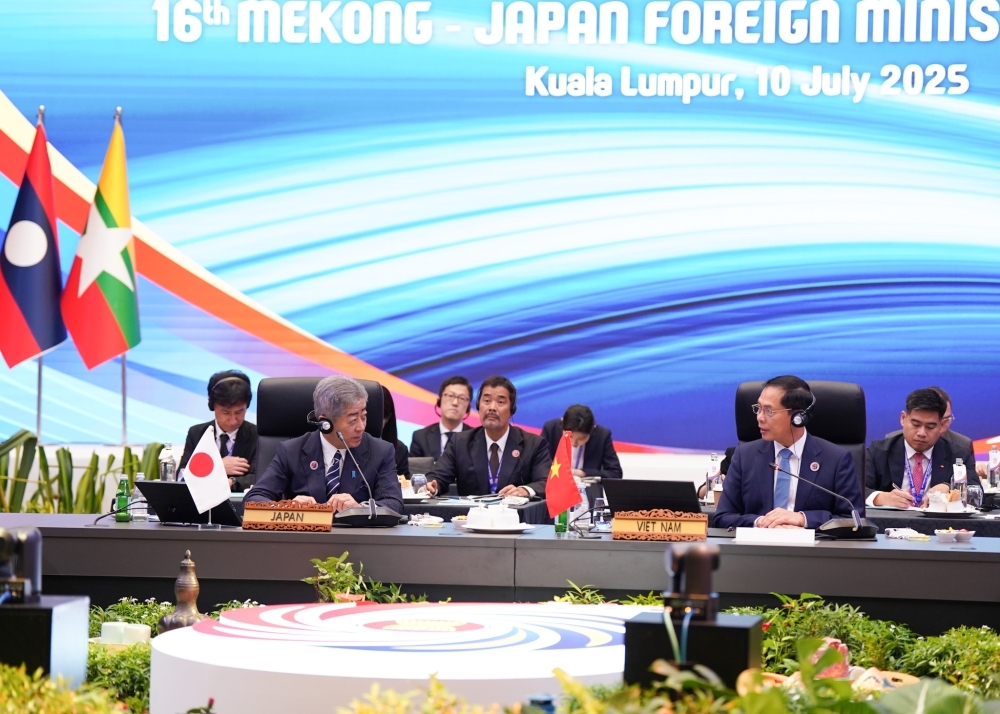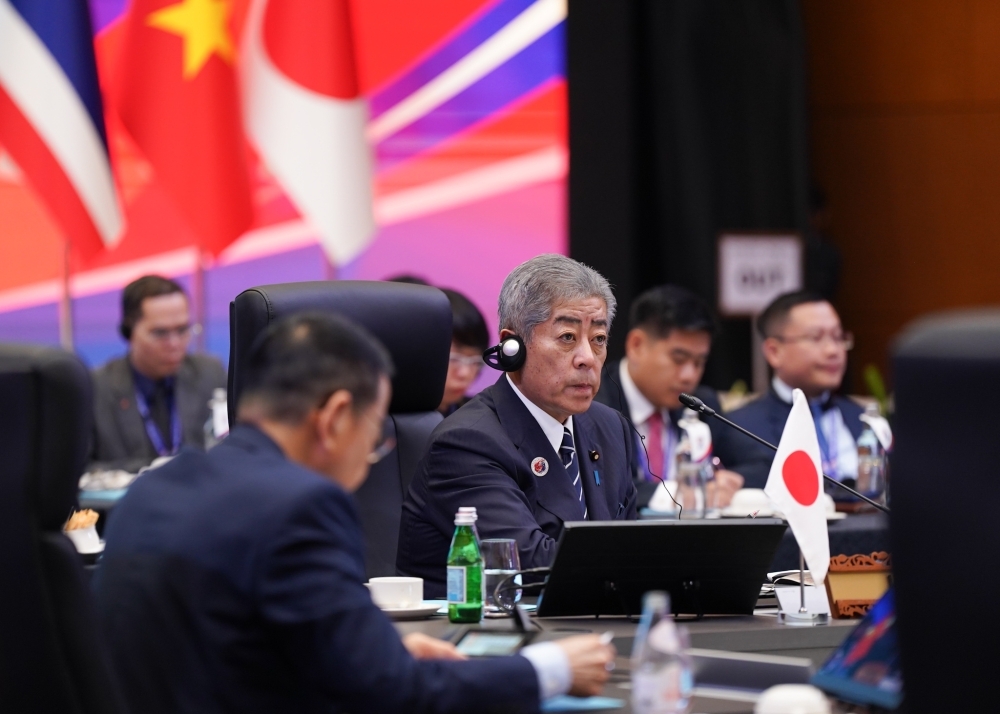Asia
Mekong-Japan Foreign Ministers’ Meeting
July 10, 2025



On July 10th, commencing at 1:05 p.m. ( 2:05 p.m., Japan time. ) for approximately 50 minutes, the Sixteenth Mekong-Japan Foreign Ministers’ Meeting was held by Mr. IWAYA Takeshi, Minister for Foreign Affairs of Japan, and H.E. Mr. Bui Thanh Son, Deputy Prime Minister, Minister of Foreign Affairs of the Socialist Republic of Viet Nam as co-chairs. The summary of the meeting is as follows. After the meeting, Co-chair Statement on the implementation of the “Mekong-Japan Cooperation Strategy 2024” was issued.
- Opening Remarks
Minister Iwaya expressed condolences for the significant damage caused by the earthquake in Myanmar and mentioned humanitarian assistance provided by Japan. He also stated that the Mekong region has a close relationship with Japan and the region is a key area for realizing a free and open Indo-Pacific. Minister Iwaya then stated that he would like to strengthen measures to address transnational crime such as organized online fraud, while expanding cooperation in areas such as connectivity, disaster risk reduction, decarbonization, and digitalization across the Mekong region, which are being promoted bilaterally with the Mekong countries.
Deputy Prime Minister Son expressed that he was honored to co-chair the Mekong-Japan Foreign Ministers' Meeting with Minister Iwaya, and welcomed the steady progress of Mekong-Japan cooperation since the Foreign Ministers' Meeting in July last year. - The progress of Mekong-Japan cooperation
The Mekong countries and Japan discussed the progress of Mekong-Japan cooperation based on the "Mekong-Japan Cooperation Strategy 2024" adopted at the Mekong-Japan Foreign Ministers' Meeting at the end of July last year, and decided to further deepen cooperation in each field.- Disaster risk reduction
Minister Iwaya stated that it is necessary to focus on disaster risk reduction in order to enhance the resilience of the Mekong region, which is prone to disasters, and expressed Japan's desire to actively cooperate as a disaster-prone country. - Economy
Minister Iwaya stated that it is important to promote decarbonization and the utilization of digital technology, along with the improving the investment environment, for the sustainable economic growth of the Mekong region. He expressed his desire to cooperate, including through co-creation for common agenda initiative, with the Asia Zero Emission Community (AZEC), and the OECD. He also stated that a co-creation workshop on AI will be held in Bangkok in cooperation with the OECD this August. He then stated that Japan has long placed importance on connectivity in the Mekong region and will continue to cooperate in both hard and soft aspects. He also pointed out that for the stability and development of the Mekong region, the free movement of people and goods across borders is essential to securing business supply chains. - Security and countermeasures for transnational issues
Minister Iwaya stated the importance of strengthening security cooperation with each Mekong country as the international situation becomes increasingly severe. In addition, he stated that North Korea’s malicious cyber activities including cryptocurrency thefts, as well as organized online fraud, and money laundering based in the region are serious issues, and Japan will strengthen measures such as capacity building through the United Nations Office on Drugs and Crime (UNODC) and information sharing among senior officials. The Mekong countries highly valued their cooperation with Japan and expressed expectations for continued cooperation in fields such as infrastructure support to enhance regional connectivity, human resource development, water resource management. They also expressed expectations for strengthening cooperation with Japan in new fields, including promoting investment through partnerships with private enterprises, industrial advancement, digitalization, and 3 decarbonization. In addition, the Mekong countries expressed their intention to further promote cooperation on transboundary issues, including organized crimes. - Situation in Myanmar
Minister Iwaya pointed out that, regional peace and stability are important in order to advance Mekong-Japan cooperation across the Mekong region, and expressed serious concern that, there has been no sign of improvement in the situation even though four and a half years have passed since the coup d’état in Myanmar, and strongly urged for the credible ceasefire and progress in sincere dialogue among the parties concerned.
- Disaster risk reduction
- Lastly, Minister Iwaya stated that, amidst an increasingly uncertain international situation, it is important for the Mekong region to achieve peace and stability and to steadily advance Mekong-Japan cooperation and the Co-chair statement of the 16th Mekong-Japan Foreign Ministers’ Meeting on the implementation of the “Mekong-Japan Cooperation Strategy 2024” was decided to be issued.


